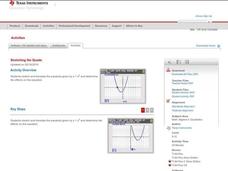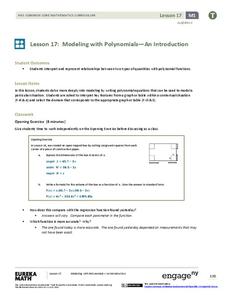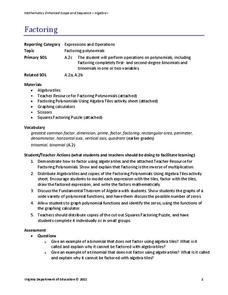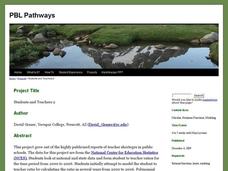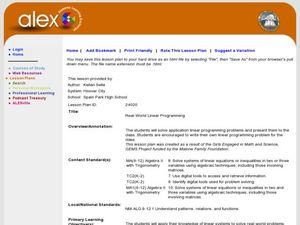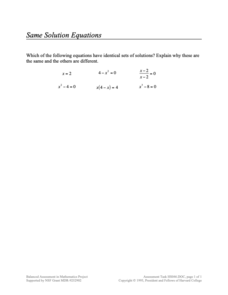Curated OER
Stretching the Quads
Explore parabolas in this algebra lesson with the graphing calculator. The class investigates what effects the changing of the parameters of the vertex form of a quadrati have to its graph. They find the zeros of a quadratic graphically...
Balanced Assessment
Local and Global Behavior
Create rules for numerical sequences. Pupils develop local rules and recursive rules for number sequences. The sequences are linear, quadratic, and cubic in nature. Scholars find that some local rules do not work, no matter where in...
Curated OER
Fibonacci II
Study Fibonacci sequences and see a related set of numbers. Learn and review Lucas numbers and use of quadratic equations to find a general term of a sequence of numbers that is generated by a recurrence relation similar to Fibonacci's.
West Contra Costa Unified School District
Investigating the Discriminant
When is finding the discriminant enough? Using the quadratic formula helps find solutions to quadratic equations, but there are times when just using the discriminant is appropriate. Use this algebra II lesson to help classes see...
Concord Consortium
Transformations-Diagnostic
Change the way you teach about rewriting expressions. A diagnostic task asks learners to transform expressions in different ways. Given two linear expressions and two quadratic expressions, they rewrite them into the indicated forms.
EngageNY
Modeling with Polynomials—An Introduction (part 2)
Linear, quadratic, and now cubic functions can model real-life patterns. High schoolers create cubic regression equations to model different scenarios. They then use the regression equations to make predictions.
02 x 02 Worksheets
Factoring
Factor in this resource when teaching how to factor polynomials. Scholars use algebra tiles to factor linear and quadratic expressions. They practice their skill by working on example problems from a worksheet.
PBL Pathways
Students and Teachers 2
Examine trends in student-to-teacher ratios over time. Building from the first task in the two-part series, classes now explore the pattern of student-to-teacher ratios using a non-linear function. After trying to connect the pattern to...
Kuta Software
Imaginary Numbers
Here is a worksheet that takes all aspects of quadratic functions and incorporates imaginary numbers into the problems. The problems range from simplifying to graphing and solving by using a variety of methods with imaginary and complex...
Curated OER
Real-World Linear Programming
Explore linear programming on a website game. Partners solve a real-world problem by setting up an objective function and a linear inequality. They graph their results on chart paper and also using a calculator before presenting their...
EngageNY
Modeling from a Sequence
Building upon previous knowledge of sequences, collaborative pairs analyze sequences to determine the type and to make predictions of future terms. The exercises build through arithmetic and geometric sequences before introducing...
EngageNY
Are All Parabolas Similar?
Congruence and similarity apply to functions as well as polygons. Learners examine the effects of transformations on the shape of parabolas. They determine the transformation(s) that produce similar and congruent functions.
Curated OER
Rumors
Your young gossipers write an exponential function for the number of people who have heard a rumor after a number of days have passed. Learners then answer a series of questions, including whether or not the solutions are realistic by...
Balanced Assessment
Transformation I
Rewriting expressions in different forms is an essential algebra skill. Support the development of this skill by using a task that asks scholars to begin with a linear, quadratic, and rational expression and then manipulate...
PBL Pathways
Arch Project
Model real-life structures with mathematics. A project-based lesson presents a problem situation requiring classes to develop a function to model the St. Louis Arch and the Rainbow Bridge in Arizona. They create their models by...
Concord Consortium
Same Solution Equations
Group equations by their solutions. Given six different equations, pupils determine which have the same solutions. Scholars explain why some are the same and some are different.
101 Questions
Let's Jump This Jump!
Jump at the chance to use a crazy fun resource. After viewing a short movie clip of a motorcycle stunt, scholars determine whether the motorcyclist will clear a row of buses. They'll likely use a graph of a quadratic function to make...
Curated OER
Quadratic Inequalities
In this quadratic inequalities instructional activity, students graph six quadratic inequalities. They solve two quadratic inequalities to identify one solution. In this quadratic inequalities instructional activity, students draw the...
Curated OER
Quadratic Equations
In this algebra instructional activity, students define the word "quad" and solve problems with quadratics. They factor polynomials by the quadratic formula and completing the square.
Mathalicious
XBOX Xpotential
Touchdown! This is an exponentially insightful instructional activity that explores the growth of football games with different video game consoles. Class members discuss whether the increase of mergahertz can be described as linear...
Curated OER
Introduction to Solving Quadratic Equations by Factoring
Pupils solve quadratic equations. In this algebra lesson, students factor and graph linear and quadratic functions. They identify the standard and linear form of each equation.
Curated OER
Quadratic Rules and Graphs
Students identify the properties of quadratic equations. For this algebra lesson, students find the vertex and intercepts of a parabola. They factor quadratics and identify the zeros of the equations.
Curated OER
Quadratic Functions
For this algebra worksheet, students perform transformations on quadratic functions. They describe the different properties of quadratic functions. There are 12 problems.
CPM
How to Recognize the Type of Graph from a Table
Linear, quadratic, and exponential functions are represented only by their table of values in this simple, well-written worksheet. Learners decide the type of graph represented based on the differences in the function values....


